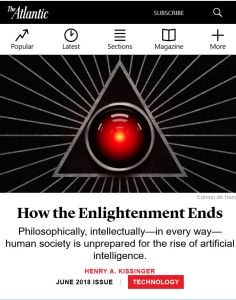
Henry Kissinger
How the Enlightenment Ends
The Atlantic, 2018
What's inside?
Artificial intelligence has no moral compass. Can society allow it to make decisions on behalf of humans?
Recommendation
Most people associate former US secretary of state Henry Kissinger with old-school political realism. In a new essay in The Atlantic, however, he strays from his usual foreign policy expertise to warn about a novel threat that has remained below the radar of most international relations experts: the rise of artificial intelligence. Although his article betrays that Kissinger is treading on new territory, his conclusion about the social implications of intelligent machines are worth considering. getAbstract recommends familiarizing yourself with Kissinger’s concerns.
Take-Aways
- The use of artificial intelligence (AI) in a growing number of human endeavors is challenging modern Western concepts of what it means to be human.
- The use of search algorithms to find information discourages humans from putting new content into context and from engaging in deeper reflection.
- Relying on AI to make decisions about an uncertain future can lead to unanticipated outcomes due to AI’s inability to put its actions into context.
- Furthermore, humans mustn’t defer to AI when it comes to making value judgments and defining what is moral.
- AI developers will need to work with people steeped in philosophy and the humanities to define AI’s rightful purpose and place in human society.
Summary
The use of artificial intelligence (AI) in a growing number of human endeavors won’t only transform society and politics but will also challenge modern Western concepts of what it means to be human. Since the 18th-century Enlightenment, humans have placed individual insights over dogma, favored knowledge acquisition through the scientific method, and placed great faith in the human capacity to reason and reflect.
“Users of the Internet emphasize retrieving and manipulating information over contextualizing or conceptualizing its meaning. They rarely interrogate history or philosophy; as a rule, they demand information relevant to their immediate practical needs.”
The advent of the Internet has altered the way people acquire knowledge. Online search algorithms, including personalized search results, allow people to access relevant information quickly and in a highly targeted way. Though expedient, these search algorithms induce humans to neglect putting newly acquired knowledge into broader perspective, reflect on it or question its underlying philosophical assumptions. The same goes for politics: As social media sites tailor political messages to individual users based on their personal concerns and political leanings, citizens fail to grasp the broader context of policy issues and don’t weigh competing priorities against one another.
“The US government should consider a presidential commission of eminent thinkers to help develop a national vision. This much is certain: If we do not start this effort soon, before long we shall discover that we started too late.”
AI algorithms excel at interpreting data and making strategic judgments based on previous observation. Yet currently, AI is unable to take context into account when executing tasks. This single-minded task execution can thus lead to unanticipated outcomes. Furthermore, as AI takes on making decisions on behalf of humans, humans may soon no longer be in charge of making value judgments. The prospect of humans deferring to algorithmically-powered machines when it comes to deciding what is ethical or reasonable, however, is disconcerting. Finally, AI lacks the capacity to explain the rationale behind its actions. Should AI come to master this ability sometime in the future, it is questionable whether humans will be able to follow the reasoning behind a solution that may or may not be superior. Consequently, humans would no longer be in charge of interpreting the world around them and defining meaning. To address these concerns, AI developers will need to work with people steeped in philosophy and the humanities to define AI’s purpose and place in human society.
About the Author
Henry A. Kissinger served as national security adviser and secretary of state to US presidents Richard Nixon and Gerald Ford. He wrote widely on American foreign policy and diplomatic history.
This document is restricted to personal use only.
My Highlights
Did you like this summary?
Read the articleThis summary has been shared with you by getAbstract.
We find, rate and summarize relevant knowledge to help people make better decisions in business and in their private lives.
Already a customer? Log in here.



















Comment on this summary